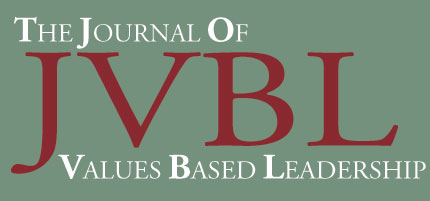- CONTENTS:
- Table of ContentsLetter from the EditorSustainability and the Bottom Line: The Responsible Collusion of Economics, Social Responsibility, and the EnvironmentProgress Toward Zero: The Climb to SustainabilityPlant Tour and Meeting with Members of Interface's Sustainability Team: December 16, 2009Driving Sustainable Innovation: A Pioneer for the 21st CenturySucceeding Through Collaborative Conflict: The Paradoxical Lessons of Shared LeadershipClimate 2030: A National Blueprint for a Clean Energy EconomySpiritual Enterprise: Doing Virtuous Business
- SUSTAINABILITY AND THE BOTTOM LINE: THE RESPONSIBLE COLLUSION OF ECONOMICS, SOCIAL RESPONSIBILITY, AND THE ENVIRONMENT
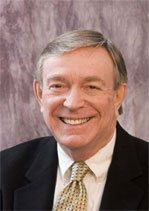
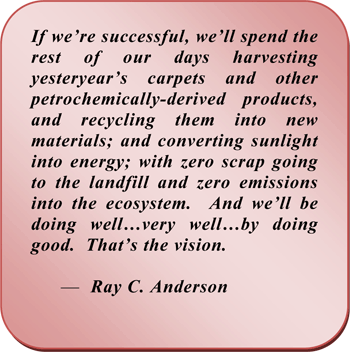
Ray C. Anderson.
Founder and Chairman
Interface, INC., Atlanta, GAIntroduction
The advance of technological changes over the last several decades signaled greater comfort for both the homeowner and the business entrepreneur. In 1973, Ray C. Anderson founded Interface, Inc., which has become a billion-dollar corporation, and the world’s largest producer of modular floor coverings. In 1995, Interface, an established, highly profitable business, together with its founder, unwittingly and eventually intentionally, became subject to strict self-scrutiny as pressures of ecological disaster could not longer be ignored. While the company had generated thousands of jobs, was fiscally sound, and producing useful products in an international marketplace, environmental consequences of these successes became a threat which could no longer be ignored. While other business leaders might not be concerned with the negative ramifications on the planet’s eco-structure, Ray Anderson jettisoned the notion of spending his remaining days on earth, living in a sheltered zone of comfort and accomplishment. Instead he experienced an inner conflict of guilt and remorse through re-examining the nature of his business and his leadership role in that business. He literally effected the beginnings on a mid-course correction, moving from earth plunderer to its advocate and protector.
The following is a synopsis of Mid-Course Correction, and the dates and figures used refer to that time period.
Anderson, Ray C. Mid-Course Correction: Toward a Sustainable Enterprise: The Interface Model. White River Junction, Vermont: Chelsea Green Publishing Company, 1998).
MidCourse Correction
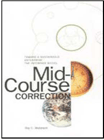 In 1994, Anderson was asked to present his company’s environmental policy. The problem? There was none. It was also at this time that Anderson stumbled upon Paul Hawkin’s The Ecology of Commerce and was particularly captivated by the chapter, “The Death of Birth.” Feeling as if he had been speared in the chest, Anderson made a commitment to reversing the direction of his company. He understood that all business successes bore a price — and that price was ultimately being borne by the planet, its inhabitants, and its symbiotic ecosystems. Specifically, at the time of authoring Mid-Course Correction, Anderson discovered a particularly troublesome yet irrefutable fact about the business he had begun in 1973: 800 million pounds of non-renewable material extracted from the earth was required to generate 802 million dollars worth of products.
In 1994, Anderson was asked to present his company’s environmental policy. The problem? There was none. It was also at this time that Anderson stumbled upon Paul Hawkin’s The Ecology of Commerce and was particularly captivated by the chapter, “The Death of Birth.” Feeling as if he had been speared in the chest, Anderson made a commitment to reversing the direction of his company. He understood that all business successes bore a price — and that price was ultimately being borne by the planet, its inhabitants, and its symbiotic ecosystems. Specifically, at the time of authoring Mid-Course Correction, Anderson discovered a particularly troublesome yet irrefutable fact about the business he had begun in 1973: 800 million pounds of non-renewable material extracted from the earth was required to generate 802 million dollars worth of products.Instead of emphasizing Interface’s successes in providing valuable goods to the public and employment opportunities to over 5,000 people and their dependents at that time, Anderson acknowledged that the perpetuation of this justification of “business as usual” could never obfuscate the real truth of conducting business in this manner. He realized that changes had to be made and that Interface had to be re-tooled. Retreat was never an option.
With this epiphany, Anderson did not eschew a profit motive in his business operations; he simply could not continue to plunder the earth, leaving behind a legacy of environmental destruction for future generations. Instead, to determine whether there was a place for his product on the earth which did not threaten its very existence, he became determined to rebuild a profitable business premised upon environmental respect and stewardship. Anything short of this goal would continue a process of unregulated thievery allowing people to take what was not theirs without regard for the consequences.A basic tenet of criminal justice is that being caught with another’s property without the owner’s permission is unlawful and must be punished accordingly to not only rebuke the wrongdoer, but to prevent similar behaviors from reoccurring. But since the Industrial Revolution marked by decades of innovation eclipsing the first half of the twentieth century, the plundering of the earth’s resources to generate profit has largely been overlooked or conveniently ignored. Fostering employment opportunities and spearheading innovation justified the means. With new awareness of the price being paid for increasing individual comfort, the business person can no longer feign ignorance with respect to the decline in the earth’s interdependent eco-systems resulting from polluting business practices. With truly ethical leadership, the conscience should grab hold of the soul and command instant, pervasive, and restorative action. The re-tooling process of Interface had begun, stimulating the development of a new way of thinking in a formidable way.
Navigating the Summit of Sustainability
The task of reversing the “plundering” process would become even more daunting for Anderson when he went a significant step further with his pledge to give back to the earth more than what Interface was taking from it. But in doing so, Anderson was keenly aware about the concerns of third parties who were also Interface stakeholders. Would the company’s shareholders object to this plan of restitution and restoration? Would the employees at Interface begin to doubt Anderson’s continued leadership and thus the security of their own jobs? Would the quality of the products manufactured by the company be compromised?
While a values-based leader cannot be ignorant of other stakeholder concerns, intimidation could easily lead to forfeiture of one’s convictions, paving the way for a full retreat and the surrender to dangerous, continued conformity to old standards. Rather, a leader who is armed with the truth and fueled by an inner passion to correct the wrongs of the past is imbued with the necessary fortitude to reason with other stakeholders. Anderson, as Interface CEO at the time and now future shaper of sustainable business, acknowledged that not everyone would be pleased at this new direction — at least in the short-run — but by simply highlighting the enormity and gravity of the destruction of the biosphere, short-term gains would be shadowed by long-term product sustainability. Anderson’s conviction of bringing to light the damage already committed to earth’s biodiversity only buttressed his goal to make Interface the first corporation to achieve a zero negative impact upon the earth. The goal was lofty as this determination of biological harmony would not simply cover the manufacturing process of Interface carpeting, but would extend to the company’s suppliers all the way through to the product’s distribution chain. From the time a shipment of materials would leave the headquarters of another company destined for Interface and from the moment an Interface employee would make his or way to company headquarters to begin a new shift, the planet would not be harmed. Similarly, upon the completion of the product, distribution would reach its destination points again without negative impact to the earth.
For Anderson, there was simply no going back. With company technicians, engineers, scientists, and the Interface workforce all equally imbued with similar purpose, the goals of mandatory remedial measures would be accomplished. Thus, with such an unshakeable conviction, the company embarked upon a course of sustainability while remarkably generating profit, preserving company jobs, and actually improving the quality of its products.
Equipped with a life characterized by renewed hope and purpose, Anderson had no intention of quarantining his new outlook. He has freely shared his newfound knowledge with other beleaguered companies (i.e., other profitable plunderers). This passion of remedial action without the forfeiture of profit-making had become infectious. The workers at Interface also share in this commitment to zero mission by knowing that their work is no longer simply defined as a five day a week, 9 to 5 job. Instead, garnering a paycheck now incorporates a sense of mission — one of working to save the world while paying the bills. With the Interface model, engaging the mind, stimulating creativity, and sharing ideas have successfully produced a greatly motivated workforce. This infusion of ethics into the workplace and the generation of pride in the manner of how business is conducted have not only resulted in financial rewards for the entire workforce of Interface, but in the spiritual strengthening of the company’s satisfied customers, vendors, and employees.
Team Commitment
Interface has coined an acronym for this combined effort and common vision: Quality Utilizing Employees and Teamwork (QUEST). The presence of dedicated workforce members motivated by a sense of newfound worth has been the key ingredient in the company’s achievement of the first of its many restorative goals; within the first 3½ years of the company’s redirection, it was able to reduce its total waste by 40%, generating a savings of $67 million (now more than $400 million cumulatively).
Interface had once thrived on the use of petrochemical, manmade materials. By the mid-1990s, the company embraced a firm commitment to recycle, reuse, and recapture waste materials not only generated by Interface, but by its competitors as well. In this manner, Interface could continue its business operations in good conscience without ever extracting another drop of oil from the earth. Anderson’s vision, and the reality of an ever-evolving multinational corporation, continues to bear fruit through material recapture and reuse. At the time of the release of Mid-Course Correction, Interface had successfully reduced greenhouse gas emissions by 71% in absolute tonnage and many of its operations are now being powered through solar, wind, and methane gas recapture — all renewable sources of energy.
Leaving a Responsible Legacy
As the Interface model has become the paradigm of sustainable manufacturing, there is dwindling disagreement in today’s world as to the debilitating effects of expanding landfills and increasing CO2 emissions, all of which adversely affect ecosystems and human health. In 2007, there were more than 10,000 landfills in the United States, accepting waste from across the borders and emitting non-recaptured and hazardous methane gases. The world is experiencing an epidemic of cancers and lethal, indefinable infections, viruses, and respiratory problems never before experienced in history. If the original goals of our innovative forbearers were dedicated to improving lifestyle and ameliorating discomfort, what do we say to the parents of a 4-year-old diagnosed with a cancerous neuroblastoma of the brain? What do we say to the teenager who just lost his 44 year-old mother to metastatic breast cancer, especially when the family lacked any history of potential risk factors? Is this what the pioneers of the first Industrial Revolution envisioned in their quest for progress in the business sector?
Simply stated, business does not work without the infusion of ethics. While “ethics” can be interpreted in a relative manner, there is no dispute within the scientific community as to the deleterious effects of unrestricted manufacturing processes and the role of environmental factors in generating health crises. The “cradle to grave” designation ― once descriptive of wasteful industrial practices ― is capable of evolving into a “cradle to cradle” approach, triggering a newfound common sense thinking demonstrated by both producers and consumers alike. The Interface experience has demonstrated this success.
Interface continues to pursue a Mission Zero™ quest for complete sustainability in its business operations. Interface has successfully reduced the amount of waste material formerly routed to landfills by 175 million pounds through its program, ReEntry.™ The consumption of water ― deemed the world’s new “oil” ― used in Interface’s modular carpet operations has been reduced by 74%. Energy consumption in the company’s business operations has decreased by 44% while increasing renewable energy worldwide to 28% of total energy. The company is successfully moving to its ultimate goal of achieving “closed-loop recycling” as demonstrated by the implementation of its sustainable programs of recycling plastics and discarded carpet in the manufacture of new floor coverings. By utilizing closed-loop practices, no waste products or toxic pollutants will be released into the earth’s atmosphere, waterways, or landfills.
God’s Currency:
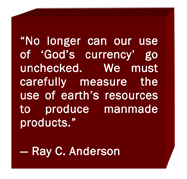 Within the last several years, Anderson has devised a term which he applies to the measurement of using the earth’s resources to produce manmade products: EcoMetrics. This is what he regards as “God’s currency.”Before the company’s retooling, one product unit produced at Interface required 10 pounds of a petrochemically-derived, nonrenewable material — the end products of which are deadly toxins which can lead to deleterious health effects, resource depletion, and habitat destruction.
Within the last several years, Anderson has devised a term which he applies to the measurement of using the earth’s resources to produce manmade products: EcoMetrics. This is what he regards as “God’s currency.”Before the company’s retooling, one product unit produced at Interface required 10 pounds of a petrochemically-derived, nonrenewable material — the end products of which are deadly toxins which can lead to deleterious health effects, resource depletion, and habitat destruction.The idiom “haste makes waste” has never lost its impact and importance, especially in advancing industrial interests; now its consequences must be taken more seriously more so than ever before. The rush toward profit-making and the manufacture of a greater variety of products reminiscent of the first Industrial Revolution should be closely and comprehensively studied. The entire nature of a company’s research and development department must be re-examined. As new and purportedly better products are being created, the particles of the creation must be examined — not just for their inclusion into the new product — but for their particular impact upon the environment. Governmental regulators must exercise restraint and refrain from acquiescing so readily to the demands of the corporate world for both new product approval and widespread dissemination. The implications of wasteful environmental impact, first brought to the attention of the public through books such as Daniel Quinn’s Ishmael, Rachel Carson’s Silent Spring, and Paul Hawkin’s The Ecology of Commerce, all demonstrate how a new product or innovation must be thoroughly assessed for its benefit to humankind. Any negative impact must be thoroughly weighed before the stamp of approval is given.
Call to Action
Anderson has made it clearly known through his books, articles, speeches, and interviews that the change in the manner of how Interface was doing business emanated from an epiphanal realization experienced after reading The Ecology of Commerce. One book exposed certain truths that would change his mindset forever. He has noted that he was particularly struck with the facts of unchecked consumption trends and unbridled and unregulated industrial practices. Upon discovering that approximately 25 billion tons of topsoil are being lost on an annual basis while global population rates are skyrocketing, a collective call to action was imperative. The rapid increase of the number of endangered 13 species in serious threat of extinction was nothing short of shocking. And now, while newer technologies are being invented — and in some instances re-introduced to the public — ice caps are melting at a faster than predicted rate and clean water deposits are evaporating or being further abused and polluted.
Millions of years have witnessed the evolution of the species and the creation of the splendor and richness of the planet. Early mankind lived in tandem with nature, respecting its gifts and powers. However, over a course of a very short period of time, industry and mass consumerism have thwarted evolution and triggered a destructive path of devolution. The litany of environmental catastrophes — the destruction of the rain forests, unbridled emissions of greenhouse gases, pollution of fresh water depositories, the withering away of a variety of trees, and the depletion of wetlands — all demand new ethical leadership. Business leaders who do not heed the warnings are disregarding the alarming diminished capacity of the planet. As Anderson opines, who will lead the Second Revolution, armed with these truths and committed to restructuring business operations? In the past, mankind was expected by the Church to conquer and rule over nature, but the clergy today has not posited the answer to real change. And since governmental representatives have demonstrated a reluctance or incompetence to create change, it is clearly up to business and industry leaders to redefine how commerce should be conducted.
Effective Leadership
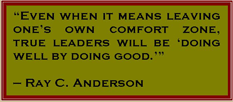
According to Anderson, true leadership must redefine wealth, prosperity and economic growth. Pursuit of these goals without due deference of the earth’s resources signals inevitable ecological suicide. These warnings do not stem from alarmists or eco-conspiracies; the need to create a new mindset is simply a matter of respect, good purpose, and simple common sense. Effective leadership must also effectively engage the workforce. Instead of perpetuating the inimical tension between labor and management, all employees must be viewed and treated as potential contributors to sustainability solutions. True leaders must not shy away from challenges and seemingly unnavigable obstacles, but must rather seize new opportunities for change.
While “doing good” focuses upon the responsible production of a useful product without further usurping Earth’s resources, Interface’s “doing good” has resulted in the company “doing well” fiscally. Generating a profit will not come from mere “green washing,” but emanates from genuinely gaining the public’s confidence that the manufacturer is truly producing a sustainable product. Resource-efficient companies are attracting not only favorable public opinion and investment opportunities, but are also wooing suppliers and vendors. Investors have moved to the adoption of a triple bottom line measure of business success, employing financial, ecological, and socially responsible delimiters. Ostensibly, it would be foolish to surmise that the individual investor is no longer interested in making a quick profit. However, with the revelation of our dying world, more and more investors are demanding socially responsible investments and redefining the products that are necessary for comfortable living. Frivolous products and throwaways must give way to items that assist our health and do not deplete the earth’s resources or thwart resource efficiency. Any other mindset threatens the existence of humankind. As Anderson firmly believes, there is no alternative but to forge a new way of defining consumption and discarding the once entrenched principle of the unlimited natural resources and technological panaceas.
The business person who does not heed the call will be eliminated through market forces and natural social responsibilities. The unresponsive business will become the wasteful and inefficient competitor. By leading business and industry responsibly into this second Industrial Revolution, the nation’s GDP will be bolstered in line with the decreased number of environmental clean-ups, new and resistant diseases, and an effective addressing of natural catastrophes. Efficient, closed-loop production and the redefinition of human consumption needs will naturally trigger the elimination of industrial and human short-sightedness.
And what type of person will lead this revamped, secondary revolution? Anderson answers this query by emphasizing that wealth and reputation are not necessary qualifications or characteristics. Passion, motivation fueled by notion of a greater purpose, the knowledge that “Davids” really do conquer “Goliaths,” will dictate our next generation of business and industrial leaders. Before this occurs, however, business and industry must first understand, achieve, and promote the influence of the concept of sustainability. Employing newfound knowledge is certainly a bold first step; sharing this knowledge is a dual responsibility. Success will be achieved by truly living for a higher purpose and for one another.
Anderson concludes by stating that when hope is translated into concrete action effecting real change, change breeds excitement and creation of newfound purpose. This is the values-based leadership demanded of our global village.
Anderson Biography
Ray C. Anderson, Founder and Chairman (CEO for the first 28 years) of Interface, Inc. ― the world’s largest manufacturer of modular floor coverings and a billion-dollar company ― has been named “the greenest chief executive in America.” Anderson, an industrial engineer and honors graduate of the Georgia Institute of Technology, currently holds eight honorary doctorate degrees. In 1973, he established Interface after working at various positions for Deering-Millken and Callaway Mills. Over two decades later, Anderson made a commitment to steer his company towards a zero emission manufacturing and processing endeavor to eliminate the negative impact upon the environment by year 2020, primarily through the use of new sources of energy and materials.
Anderson has served as a prominent commentator for several award-winning documentaries, including Leonardo DiCaprio’s “The 11th Hour,” the internationally-acclaimed “The Corporation,” and most recently, the 2007 Greenbuild Film Festival winner, “Trashed.” In 2007, he was named one of Time magazine’s “Heroes of the Environment” and served as co-chair of the President’s Council on Sustainable Development during President Clinton’s administration. He has authored several books including “Face It,” “The Journey from There to Here: The Eco Odyssey of a CEO,” and “Mid-Course Correction: Toward a Sustainable Enterprise – The Interface Model.” Anderson has completed a new book tracking the company’s pursuit of complete sustainability. Anderson’s books all chronicle his commitment to reassessing and reorganizing the operations of Interface to achieve a zero impact upon the environment and to ultimately move toward engaging in restorative measures.
Recognition of Anderson’s efforts to generate ideas for sustainable commerce have emanated from business, environmental and governmental organizations including the U.S. Green Building Council, the Southern Institute for Business and Professional Ethics, Harvard Business School Alumni, and the National Wildlife Federation. He was named Entrepreneur of the Year in 1996 by Forbes Magazine and Ernst & Young. In 2006, Interface was listed as #1 in global sustainability by GlobeScan. Anderson has been awarded the George and Cynthia Mitchell International Prize for Sustainable Development (selection by the National Academy of Sciences), the Civic Ventures’ Purpose Prize, Auburn University’s International Quality of Life Award, and Global Green’s Inaugural Millennium Award.
Anderson’s mid-course change in direction demonstrates his unique ability to embrace environmental preservation efforts without forfeiting profit-making. While the 20th century Industrial Revolution generated dramatic growth, it did so with insidious consequences. Anderson has made the bold choice “to pioneer the next Industrial Revolution that is kinder and gentler to the earth,” serving as an example to numerous business organizations.
